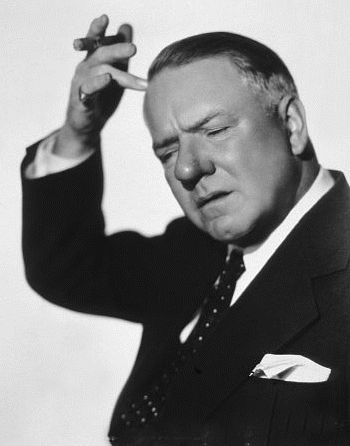
If you were to look up the word “curmudgeon” in the dictionary, you might find a photo of W.C. Fields next to the definition. While it would be a fool’s errand to try and sum up Fields’ lengthy career in just a few sentences, I’ll attempt to give you the goods on this legend of vaudeville. Born William Claude Dukenfield in Pennsylvania in 1880, W.C. Fields worked a few retail jobs in his early years in a department store and an oyster house before leaving home in his teens to pursue a career as an entertainer. At age 15, he began performing under the name W.C. Fields as a tramp juggler on the vaudeville stage, and as he injected more and more comedy into his act, he was soon a headliner in North America and Europe. In 1906, he made his Broadway debut in the musical The Ham Tree, and also began performing in Ziegfield Follies soon thereafter. During the silent era of cinema, Fields acted in a few short comedies, including Sally of the Sawdust, directed by legendary director D.W. Griffith. With the rise of the popularity of radio, Fields also began bringing his comedy to the airwaves, and by the time movies had sound, he was a well-known as a performer. In the early 1930’s, Fields began making feature-length comedies for Paramount, and soon he was a major movie star, with his cynical, alcoholic persona from his comedy act becoming indistinguishable from his off-screen persona. Among his more famous comedy films made during this time were Man on the Flying Trapeze, My Little Chickadee, and The Bank Dick. The quick-witted, sharp-tongued man that was W.C. Fields died in 1946 at the age of 66 due to an alcohol-related stomach hemorrhage. He maintained his dry sense of humour right to the end, as a friend reportedly caught him reading the Bible in his hospital bed and, when asked why, Fields replied “I’m checking for loopholes.” Truly, the man was a genius.
